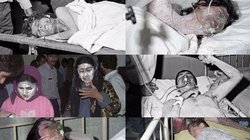 Iran’s Foreign Minister Mohammad Javad Zarif has lashed out at the US for imposing “inhumane” sanctions that have hampered access to vital medical aid by Iranian chemical attack victims.
Iran’s Foreign Minister Mohammad Javad Zarif has lashed out at the US for imposing “inhumane” sanctions that have hampered access to vital medical aid by Iranian chemical attack victims. RNA - Zarif made the remarks in a message released on Friday at a ceremony to mark the 32nd anniversary of Saddam Hussein’s bombing of Sardasht in West Azarbaijan province of Iran in 1987.
In the message, Zarif strongly criticized Washington’s unilateral sanctions, saying the US economic terrorism is against international humanitarian law.
He also referred to the US arsenal of undestroyed chemical weapons, and accused it of dodging its obligations under existing conventions.
During the Iraq-Iran war, Saddam waged several chemical attacks on Iran’s cities, leaving behind many victims who are still suffering after decades.
Iraq’s dictator, disappointed from winning the war against Iran, resorted to chemical attacks on Iranian civilians especially in the two cities of Sardasht and Sumar.
The attack on Sardasht killed over 1,000 civilians and injured another 8,000, leaving some of them permanently disabled.
Iraq is known to have launched over 350 large-scale gas attacks along the Iran-Iraq border between 1980 and 1988 on combatants and non-combatants, leaving behind over 107,000 victims.
As many as 2,600 of that total died at the time, and over 45,000 others were left in permanent need of relief aid provided by Iran's Veterans and War Victims Foundation.
Germany, Italy, the UK, the US, the Netherlands and several other countries provided the Iraqi dictator with the equipment and material to build chemical weapons apparently because they didn’t want Iran to be the winner of the eight-year war.
On Tuesday, Zarif told a conference to mark the anniversary of the Sardasht attack that the West’s claims about its fight against weapons of mass destruction are false.
The Islamic Republic, he said, had provided reliable evidence on Saddam’s use of chemical weapons against the Iranian people, but Western countries kept it under wraps.
He said the then UN chief sent six delegations to Iran in response to the country’s repeated calls which faced Washington’s acts of obstruction.
Those delegations visited Iranian hospitals, talked to the victims of Saddam’s chemical weapons attack and presented were “undeniable” evidence, which did not find any coverage in the West.
Zarif emphasized that those who claim chemical weapons are their red lines but paved the way in the 1980s for Saddam to use such armaments are in no position to accuse others.
“If you had stopped Saddam then, today Daesh wouldn’t have dared to use chemical weapons against the Iraqi and Syrian people. Even today, the Western powers are trying to cover up the use of chemical weapons by their stooges,” Zarif pointed out.
847/940